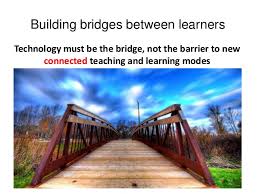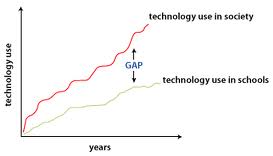
The ability to engage our students with technology, devices and apps, in the classroom is undeniable. Witnessing students who are engaged in activities that are only available in a technology environment can be inspiring. Students who are collaborating on a group essay, in real-time, with a student that is presently sick at home- was once thought to be impossible. So what could possibly be “Dangerous” about the current and future environments of our classrooms?
America’s development of our educational system has been one that continually adapts to deliver the vision that everyone is entitled to an equal education. From urban to rural educational systems, and everything in between, there are legal battles to ensure that our youth is grounded on equal footings to make the most out of themselves- no matter what their background and where they grow up. While we have succeeded in many areas to level the playing field, it is common knowledge that there continues to exist a gap in education when it comes to wealth.
As we look to technology and the World Wide Web to provide content and information to anyone, anyplace- we must be conscious that while the claims of opening the playing field and bringing global competition may be true, this playing field is only open to those who can afford the equipment to play. Comparing the sporting world to the educational classrooms, one can clearly see the danger I am referring to.
When you look at the sporting events that are truly open- Football, Basketball, Baseball, and Soccer- one can clearly see (just drive by your local fields/parks) that any child can afford to participate in these sports by simply getting equipment, make shift equipment if needed, and a group of kids. in comparison, select sports are still exclusive and not truly open to all- Golf, Tennis, Gymnastics, and Hockey. Whether a need of wealth for equipment, access to playing surface, or both: these sports are predominantly participated by players who have access to the funds to do so.
The same can be said when we compare technology in the classroom. Walk into the classroom of an affluent neighborhood, and you are almost guaranteed to see some form of a 1:1 environment. Can we say the same if we are to tour our urban area schools? Where are we likely to experience a Google Expeditions lesson taking place? While the message being sent is to open up experiences for those who normally couldn’t afford it, is this the experience being delivered? Which environment can afford the iPhones necessary for 25-30 students in just one classroom to go on this Expedition?
While I applaud the creation of Google Expeditions, iPads, Chromebooks, GAFE, Office365, and the countless Apps that are beneficial to teachers and the classroom- I will continue to advocate for the use case where by all students are able to take advantage of these advances in technology to better themselves and the world around them! There are advantages that wealth provides, however, we must limit this divide in our classrooms. We must be attentive to providing every student the opportunity to an equal education with technology.
Feel free to Like, Comment, and Share!
Thank You!




